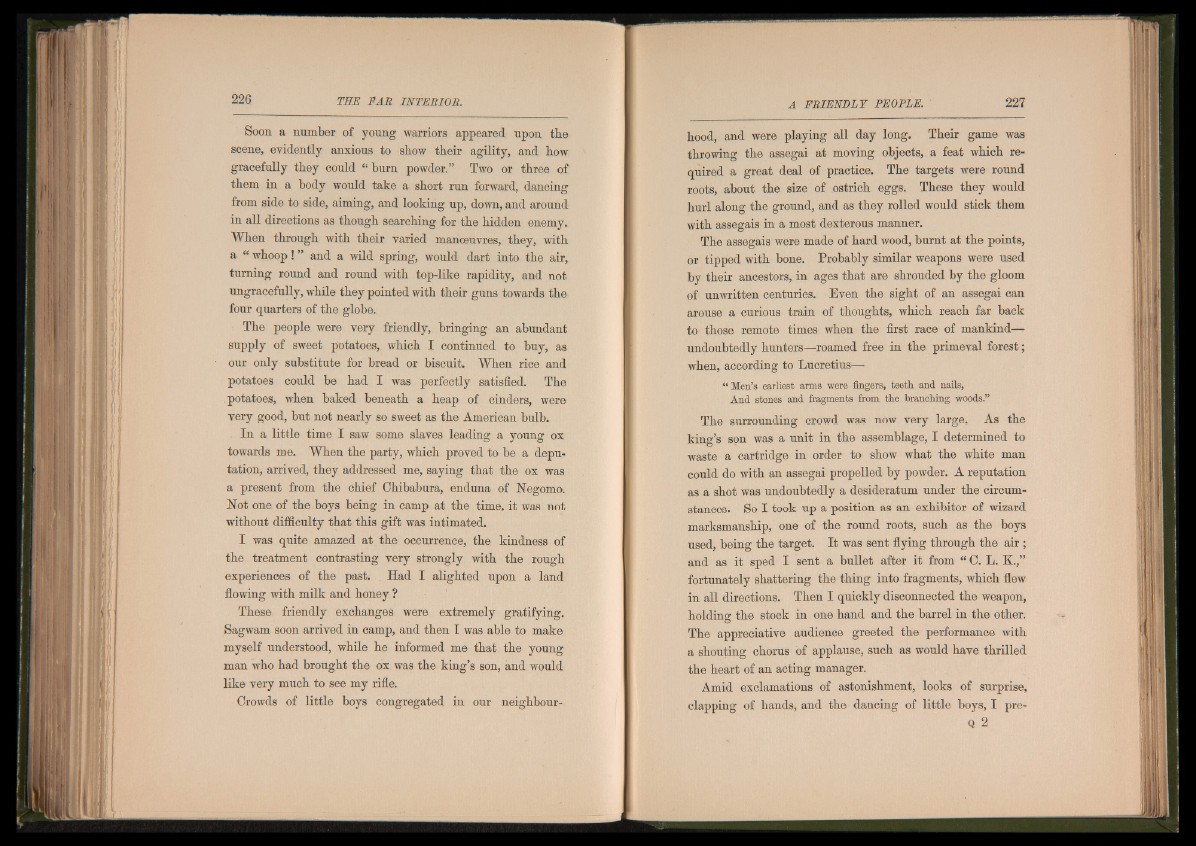
Soon a number of young warriors appeared upon the
scene, evidently anxious to show their agility, and how
gracefully they could “ burn powder.” Two or three of
them in a body would take a short run forward, dancing
from side to side, aiming, and looking up, down, and around
in all directions as though searching for the hidden enemy.
When through with their varied manoeuvres, they, with
a “ whoop ! ” and a wild spring, would dart into the air,
turning round and round with top-like rapidity, and not
ungracefully, while they pointed with their guns towards the
four quarters of the globe.
The people were very friendly, bringing an abundant
supply of sweet potatoes, which I continued to buy, as
our only substitute for bread or biscuit. When rice and
potatoes could be had I was perfectly satisfied. The
potatoes, when baked beneath a heap of cinders, were
very good, but not nearly so sweet as the American bulb.
In a little time I saw some slaves leading a young ox
towards me. When the party, which proved to be a deputation,
arrived, they addressed me, saying that the ox was
a present from the chief Chibabura, enduna of Negomo.
Not one of the boys being in camp at the time, it was not
without difficulty that this gift was intimated.
I was quite amazed at the occurrence, the kindness of
the treatment contrasting very strongly with the rough
experiences of the past. . Had I alighted upon a land
flowing with milk and honey ?
These friendly exchanges were extremely gratifying.
Sagwam soon arrived in camp, and then I was able to make
myself understood, while he informed me that the young
man who had brought the ox was the king’s son, and would
like very much to see my rifle.
Crowds of little boys congregated in our neighbourhood,
and were playing all day long. Their game was
throwing the assegai at moving objects, a feat which required
a great deal of practice. The targets were round
roots, about the size of ostrich eggs. These they would
hurl along the ground, and as they rolled would stick them
with assegais in a most dexterous manner.
The assegais were made of hard wood, burnt at the points,
or tipped with bone. Probably similar weapons were used
by their ancestors, in ages that are shrouded by the gloom
of unwritten centuries. Even the sight of an assegai can
arouse a curious train of thoughts, which reach far back
to those remote times when the first race of mankind—
undoubtedly hunters—roamed free in the primeval forest;
when, according to Lucretius—
“ Men’s earliest arms were fingers, teeth, and nails,
And stones and fragments from the branching woods.”
The surrounding crowd was now very large. As the
king’s son was a unit in the assemblage, I determined to
waste a cartridge in order to show what the white man
could do with an assegai propelled by powder. A reputation
as a shot was undoubtedly a desideratum under the circumstances.
So I took up a position as an exhibitor of wizard
marksmanship, one of the round roots, such as the boys
used, being the target. It was sent flying through the air ;
and as it sped I sent a bullet after it from “ 0. L. K.,”
fortunately shattering the thing into fragments, which flew
in all directions. Then I quickly disconnected the weapon,
holding the stock in one hand and the barrel in the other.
The appreciative audience greeted the performance with
a shouting chorus of applause, such as would have thrilled
the heart of an acting manager.
Amid exclamations of astonishment, looks of surprise,
clapping of hands, and the dancing of little boys, I pre-
Q 2